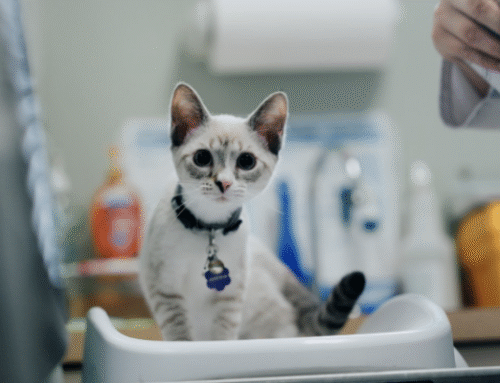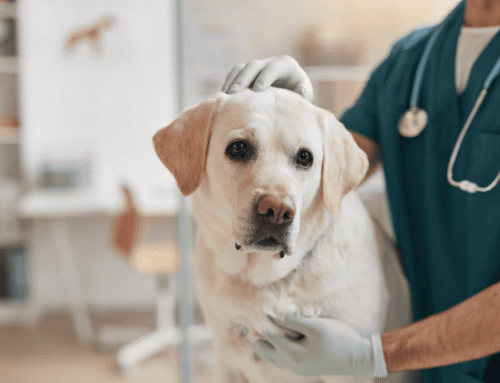Have you ever wondered if your pet’s food is truly nutritious or simply a marketing gimmick? You’re not alone. Many pet owners are puzzled by the overwhelming pet food options and conflicting information. The Safe Harbor Animal Hospital team serves up some delectable truths about pet nutrition to help you make informed choices. Grab your pet and a comfy spot as we dig into the details.
Myth: Treats are always good for pets
Pet owners love to give their dog or cat treats—who can resist those puppy-dog eyes as your dog begs for a treat? Treats may strengthen your bond with your pet, but before you give in, remember that the extra calories treats provide can add up quickly, potentially leading to weight gain and health issues for your pet. And, an unhealthy pet is not a happy pet.
For example, for dogs:
- Ham (2 oz) — Equivalent to one doughnut for humans
- Hot dog (2 oz) — Equivalent to three doughnuts for humans
- Rawhide bone (6.7 oz) — Equivalent to 10 doughnuts for humans
You may think a couple of ham slices harmless for your dog, but you have actually given them a doughnut.
For cats:
Cats are notorious for their finicky eating habits, but you must still avoid feeding them so many treats that you sabotage their overall health.
- Milk (3 oz) — Equivalent to three doughnuts for humans.
- Tuna (2 oz) — Equivalent to six doughnuts for humans.
- Cheese (1 oz) — Equivalent to eight doughnuts for humans.
Can you imagine your cat munching on a whole stack of doughnuts? These small treats pack a caloric punch that adds up quickly.
Feed your pet healthy treats, such as fresh vegetables or tuna broth.
Myth: Meat is better than meal for pets
Chicken meal often provides more protein and essential nutrients than fresh chicken and is therefore a valuable addition to your pet’s diet. Chicken meal undergoes a process that retains and concentrates vital nutrients.
- What is meal? — Meal is a concentrated protein source that contains approximately 10% water, compared with meat, which contains 70% to 80% water.
Meat and meal can be nutritious, but chicken meal offers a more concentrated, digestible option for your pet.
Myth: By-products are bad for pets
By-products in pet food often get a bad rap, but they can be a valuable source of nutrients.
- What are by-products? By-products are parts of the animal not typically consumed by humans, such as the liver and lungs, but they are nutrient-dense and provide essential amino acids, vitamins, and minerals and can be higher in protein than regular meat. They offer a more secure and sustainable supply of nutrients.
So, next time you see “by-product meal” on the label, remember it’s not necessarily a bad thing—it’s packed with nutritional goodness. Humans may turn up their nose at the mere thought of eating organs, but pets have no such inhibitions.
Myth: Grains cause allergies in pets
Grains such as corn, rice, and wheat are more than pet food fillers. Despite the current trend toward grain-free diets for pets, grains can be a valuable component of a balanced diet.
- What are grains? Grains are rich in carbohydrates, which supply energy and fiber, aid digestion, and promote healthy intestinal gut flora.
Food allergies are rare in pets, and grains rarely cause food allergies. Most pet food allergies are triggered by animal proteins.
Recent studies have linked grain-free diets to an increased risk of dilated cardiomyopathy (DCM), a serious heart condition, although research is ongoing. Grain-free diets often replace grains with legumes or potatoes, interfering with the absorption of nutrients like taurine, which is essential for heart health.
Myth: Corn is a filler with no nutrients
Corn in pet food, which often gets dismissed as a filler or a cause of allergies, plays a vital role in your pet’s diet.
- What is corn? Corn is an excellent source of protein, carbohydrates, vitamins, and minerals and is especially rich in linoleic acid, an omega-6 fatty acid that supports healthy skin and a healthy, shiny coat.
In fact, studies have shown corn is rarely a cause of allergies in pets. Of 278 cases of food allergies in dogs, corn was identified as the allergen in only 3% of cases.
Making informed decisions about your pet’s diet is fundamental for their well-being. Visit one of our three locations at Animal Hospitals of the Low Country. Our team is here to ensure that your pet lives a healthy, happy life.
We hope these nutritional truths will help you be confident about choosing the best diet for your pet. However, should you still have questions or would like our help formulating a customized diet for your dog or cat, don’t hesitate to call or book an appointment online with Safe Harbor Animal Hospital.









Leave A Comment